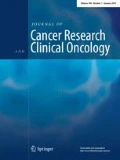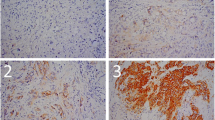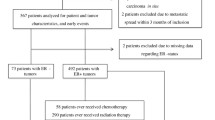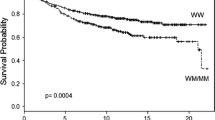Abstract
Purpose
Insulin-like growth factor 1 (IGF-1) stimulates mitosis and inhibits apoptosis. High circulating IGF-1 levels are linked with an increased risk of colorectal and breast cancer. Recently, IGF-1 single nucleotide polymorphisms (SNPs), especially variant rs2946834, have been associated with poor clinical outcome in patients with colorectal cancer. In the present study, we aimed to investigate the influence of IGF1 polymorphisms associated with IGF-1 plasma levels on event-free survival in patients with HER2-positive breast cancer.
Methods
The present study included 161 consecutive white patients with HER2-positive breast cancer. Event-free survival was calculated as the time from cancer diagnosis to either relapse or death from any cause. Genomic DNA was extracted from archived formalin-fixed paraffin-embedded tumor tissue samples; five IGF-1 polymorphisms (rs2946834, rs6220, rs1520220, rs5742694, and rs5742678), all associated with IGF-1 levels, were genotyped by SNaPshot assays.
Results
Kaplan–Meier analysis showed a poorer clinical outcome for carriers of the rare allele of SNP rs2946834 (log-rank test, p = 0.020). Concordantly, in univariate Cox regression analyses, the rare allele of SNP rs2946834 was significantly associated with a decreased event-free survival (HR = 3.06 [1.14–8.22]; p = 0.027). Multivariate analysis adjusted for age and tumor stage confirmed this result (HR = 4.02 [1.36–11.90]; p = 0.012). Other investigated polymorphisms of the IGF1 gene were not significantly associated with event-free survival (all p values >0.05).
Conclusions
This study provides first evidence that IGF1 rs2946834 polymorphism is associated with clinical outcome of HER2-positive breast cancer patients. Further studies are warranted to validate these findings.


Similar content being viewed by others
References
Al Zahrani A, Sandhu MS, Luben RN, Thompson D, Baynes C, Pooley KA, Luccarini C, Munday H, Perkins B, Smith P, Pharoah PD, Wareham NJ, Easton DF, Ponder BA, Dunning AM (2006) IGF1 and IGFBP3 tagging polymorphisms are associated with circulating levels of IGF1, IGFBP3 and risk of breast cancer. Hum Mol Genet 15:1–10
Beech DJ, Parekh N, Pang Y (2001) Insulin-like growth factor-I receptor antagonism results in increased cytotoxicity of breast cancer cells to doxorubicin and taxol. Oncol Rep 8:325–329
Bertrand FE, Steelman LS, Chappell WH, Abrams SL, Shelton JG, White ER, Ludwig DL, McCubrey JA (2006) Synergy between an IGF-1R antibody and Raf/MEK/ERK and PI3 K/Akt/mTOR pathway inhibitors in suppressing IGF-1R-mediated growth in hematopoietic cells. Leukemia 20:1254–1260
Brokaw J, Katsaros D, Wiley A, Lu L, Su D, Sochirca O, de la Longrais IA, Mayne S, Risch H, Yu H (2007) IGF-I in epithelial ovarian cancer and its role in disease progression. Growth Factors 25:346–354
Chen W, Wang S, Tian T, Bai J, Hu Z, Xu Y, Dong J, Chen F, Wang X, Shen H (2009) Phenotypes and genotypes of insulin-like growth factor 1, IGF-binding protein-3 and cancer risk: evidence from 96 studies. Eur J Hum Genet 17(12):1668–1675
Deming SL, Ren Z, Wen W, Shu XO, Cai Q, Gao YT, Zheng W (2007) Genetic variation in IGF1, IGF-1R, IGFALS, and IGFBP3 in breast cancer survival among Chinese women: a report from the Shanghai Breast Cancer Study. Breast Cancer Res Treat 104:309–319
Dong X, Javle M, Hess KR, Shroff R, Abbruzzese JL, Li D (2010) Insulin-like growth factor axis gene polymorphisms and clinical outcomes in pancreatic cancer. Gastroenterology 139:464–473
Dupont WD, Plummer WD Jr (1990) Power and sample size calculations. A review and computer program. Control Clin Trials 11:116–128
Eckstein N, Servan K, Hildebrandt B, Politz A, von Jonquieres G, Wolf-Kummeth S, Napierski I, Hamacher A, Kassack MU, Budczies J, Beier M, Dietel M, Royer-Pokora B, Denkert C, Royer HD (2009) Hyperactivation of the insulin-like growth factor receptor I signaling pathway is an essential event for cisplatin resistance of ovarian cancer cells. Cancer Res 69:2996–3003
Ferlay J, Shin HR, Bray F, Forman D, Mathers C, Parkin DM (2010) Estimates of worldwide burden of cancer in 2008: GLOBOCAN 2008. Int J Cancer 127:2893–2917
Gerger A, El Khoueiry A, Zhang W, Yang D, Singh H, Bohanes P, Ning Y, Winder T, Labonte MJ, Wilson PM, Benhaim L, Paez D, El Khoueiry R, Absenger G, Lenz HJ (2011) Pharmacogenetic angiogenesis profiling for first-line bevacizumab plus oxaliplatin-based chemotherapy in patients with metastatic colorectal cancer. Clin Cancer Res 17:5783–5792
Goldhirsch A, Wood WC, Coates AS, Gelber RD, Thürlimann B, Senn HJ (2011) Panel members. Ann Oncol 22:1736–1747
Grimberg A (2003) Mechanisms by which IGF-I may promote cancer. Cancer Biol Ther 2:630–635
Harrela M, Koistinen H, Kaprio J, Lehtovirta M, Tuomilehto J, Eriksson J, Toivanen L, Koskenvuo M, Leinonen P, Koistinen R, Seppala M (1996) Genetic and environmental components of interindividual variation in circulating levels of IGF-I, IGF-II, IGFBP-1, IGFBP-3. J Clin Invest 98:2612–2615
Helzlsouer KJ, Alberg AJ, Rollison DE, Overvad K, Kaaks R, Trichopoulos D, Clavel-Chapelon F et al (2010) Insulin-like growth factor 1 (IGF1), IGF binding protein 3 (IGFBP3), and breast cancer risk: pooled individual data analysis of 17 prospective studies. Lancet Oncol 11:530–542
International HapMap Consortium (2005) A haplotype map of the human genome. Nature 437:1299–1320
Kahán Z, Gardi J, Nyári T, Földesi I, Hajnal-Papp R, Ormándi K, Lázár G, Thurzó L, Schally AV (2006) Elevated levels of circulating insulin-like growth factor-I, IGF-binding globulin-3 and testosterone predict hormone-dependent breast cancer in postmenopausal women: a case–control study. Int J Oncol 29:193–200
Key TJ, Appleby PN, Reeves GK, Roddam AW (2010) Insulin-like growth factor 1 (IGF1), IGF binding protein 3 (IGFBP3), and breast cancer risk: pooled individual data analysis of 17 prospective studies. Lancet Oncol 11:530–542
Lang AH, Geller-Rhomberg S, Winder T, Stark N, Gasser K, Hartmann B, Kohler B, Grizelj I, Drexel H, Muendlein A (2012) A common variant of the MACC1 gene is significantly associated with overall survival in colorectal cancer patients. BMC Cancer 12:20
Lee PH, Shatkay H (2008) F-SNP: computationally predicted functional SNPs for disease association studies. Nucleic Acids Res 36:D820–D824
Lu Y, Zi X, Zhao Y, Mascarenhas D, Pollak M (2001) Insulin-like growth factor-I receptor signaling and resistance to trastuzumab (Herceptin). J Natl Cancer Inst 93:1852–1857
Mamay CL, Mingo-Sion AM, Wolf DM, Molina MD, Van Den Berg CL (2003) An inhibitory function for JNK in the regulation of IGF-I signaling in breast cancer. Oncogene 22:602–614
Matuoka K, Yu CK (1999) Nuclear factor Y (NF-Y) and cellular senescence. Exp Cell Res 253:365–371
Patel AV, Cheng I, Canzian F, Le Marchand L, Thun MJ, Berg CD, Buring J et al (2008) IGF-1, IGFBP-1, and IGFBP-3 polymorphisms predict circulating IGF levels but not breast cancer risk: findings from the Breast and Prostate Cancer Cohort Consortium (BPC3). PLoS One 3:e2578
Pollak M (2008) Insulin and insulin-like growth factor signalling in neoplasia. Nat Rev Cancer 8:915–928
Raile K, Berthold A, Banning U, Horn F, Pfeiffer G, Kiess W (2003a) IGFs, basic FGF, and glucose modulate proliferation and apoptosis induced by IFNgamma but not by IL-1beta in rat INS-1E beta-cells. Horm Metab Res 35:407–414
Raile K, Hille R, Laue S, Schulz A, Pfeifer G, Horn F, Kiess W (2003b) Insulin-like growth factor I (IGF-I) stimulates proliferation but also increases caspase-3 activity, Annexin-V binding, and DNA-fragmentation in human MG63 osteosarcoma cells: co-activation of pro- and anti-apoptotic pathways by IGF-I. Horm Metab Res 35:786–793
Rowlands MA, Holly JM, Hamdy F, Phillips J, Goodwin L, Marsden G, Gunnell D, Donovan J, Neal DE, Martin RM (2012) Serum insulin-like growth factors and mortality in localised and advanced clinically detected prostate cancer. Cancer Causes Control 23:347–354
Skolnik EY, Batzer A, Li N, Lee CH, Lowenstein E, Mohammadi M, Margolis B, Schlessinger J (1993) The function of GRB2 in linking the insulin receptor to Ras signaling pathways. Science 260:1953–1955
Slamon DJ, Clark GM, Wong SG, Levin WJ, Ullrich A, McGuire WL (1987) Human breast cancer: correlation of relapse and survival with amplification of the HER-2/neu oncogene. Science 235:177–182
Stattin P, Rinaldi S, Biessy C, Stenman UH, Hallmans G, Kaaks R (2004) High levels of circulating insulin-like growth factor-I increase prostate cancer risk: a prospective study in a population-based nonscreened cohort. J Clin Oncol 22:3104–3112
Thissen JP, Ketelslegers JM, Underwood LE (1994) Nutritional regulation of the insulin-like growth factors. Endocr Rev 15:80–101
Tsuchiya N, Wang L, Suzuki H, Segawa T, Fukuda H, Narita S, Shimbo M, Kamoto T, Mitsumori K, Ichikawa T, Ogawa O, Nakamura A, Habuchi T (2006) Impact of IGF-I and CYP19 gene polymorphisms on the survival of patients with metastatic prostate cancer. J Clin Oncol 24:1982–1989
Valenciano A, Henriquez-Hernandez LA, Moreno M, Lloret M, Lara PC (2012) Role of IGF-1 receptor in radiation response. Transl Oncol 5:1–9
Vlachostergios PJ, Gioulbasanis I, Kamposioras K, Georgoulias P, Baracos VE, Ghosh S, Maragouli E, Georgoulias V, Papandreou CN (2011) Baseline insulin-like growth factor-I plasma levels, systemic inflammation, weight loss and clinical outcome in metastatic non-small cell lung cancer patients. Oncology 81:113–118
Winder T, Zhang W, Yang D, Ning Y, Bohanes P, Gerger A, Wilson PM, Pohl A, Mauro DJ, Langer C, Rowinsky EK, Lenz HJ (2010) Germline polymorphisms in genes involved in the IGF1 pathway predict efficacy of cetuximab in wild-type KRAS mCRC patients. Clin Cancer Res 16:5591–5602
Wong AL, Lee SC (2012) Mechanisms of resistance to Trastuzumab and Novel therapeutic strategies in HER2-positive breast cancer. Int J Breast Cancer 2012:415170
Zhang M, Hu Z, Huang J, Shu Y, Dai J, Jin G, Tang R, Dong J, Chen Y, Xu L, Huang X, Shen H (2010) A 3′-untranslated region polymorphism in IGF1 predicts survival of non-small cell lung cancer in a Chinese population. Clin Cancer Res 16:1236–1244
Acknowledgments
We are grateful to Wera Hofmann (GATC Biotech, Konstanz, Germany), Bernd Hartmann (Department of Medicine and Cardiology, Academic Teaching Hospital Feldkirch, Austria), and Hans-Christian Fricke (Department of Obstetrics and Gynecology, Klinikum Konstanz, Germany) for their helpful and constructive comments on this manuscript. The present study was part financed by the European Union’s European Regional Development Fund through the INTERREG IV Program “Alpenrhein-Bodensee-Hochrhein”; Project Number: 179.
Conflict of interest
The authors declare that they have no conflicts of interest.
Author information
Authors and Affiliations
Corresponding author
Additional information
Axel Muendlein and Alois H. Lang contributed equally to this work.
Electronic supplementary material
Below is the link to the electronic supplementary material.
Rights and permissions
About this article
Cite this article
Muendlein, A., Lang, A.H., Geller-Rhomberg, S. et al. Association of a common genetic variant of the IGF-1 gene with event-free survival in patients with HER2-positive breast cancer. J Cancer Res Clin Oncol 139, 491–498 (2013). https://doi.org/10.1007/s00432-012-1355-3
Received:
Accepted:
Published:
Issue Date:
DOI: https://doi.org/10.1007/s00432-012-1355-3




